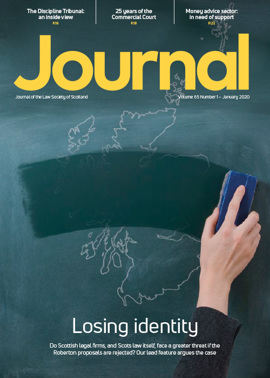It's about your future

For those advanced in their careers, attending a round table from time to time is not uncommon and invitations can be plentiful. However, for those of us at the early stages of our careers, opportunities to collaborate and share opinions and experiences are more limited. To address that gap, some colleagues and I set up the Future Law Ready round table series.
The series provides a forum for solicitors from newly qualified to four years’ PQE to share ideas and opinions freely around how they can put themselves on the best footing for a successful career in a profession that is changing at pace. The series has kindly been supported by the Law Society of Scotland and the Scottish Young Lawyers’ Association.
Who has been involved so far?
One of the myths that we’ve tried to dispel with the round tables is that in-house lawyers and those in private practice face hugely different challenges and therefore require different skillsets. It’s not clear where this myth comes from, as ultimately we are serving the same clients and therefore the skills required for high-quality client service are common across all of us.
With that in mind, the round tables have involved participants from a diverse range of organisations, showcasing the broad spectrum of legal practices that we have in Scotland. We’ve had attendees from private practice together with in-house solicitors across a variety of sectors. As it was the first time many of us had participated in a round table, having a friendly chair was really important to help get the discussion flowing and I’m grateful that Leigh Kirkpatrick (managing legal counsel, RBS) and Lynsey Nicoll (head of UK Legal, Heineken) agreed to chair the discussions. We really benefited from hearing about their experiences and practical ways that they have achieved certain goals. It’s definitely reassuring to hear that they faced some of the same challenges early in their careers that we face now.
Some key themes from the discussions
At the first round table, we reflected on what kind of impact we are making in our respective organisations at the moment, the kind of impact we want to make, and then shared lots of good ideas around practical steps we can begin to take to differentiate ourselves. It was a very open and honest discussion, acknowledging that successful careers are not built purely as a result of completing all the tasks in your inbox each day. Instead it’s about lifting your head up, being curious, meeting people, following thought leaders and looking out for opportunities to improve. In terms of key themes so far, there are a couple that stand out for me:
Proactivity
We discussed the importance of being proactive and taking ownership of our careers, rather than relying on our respective organisations (or the passage of time) to help us further our development and our careers. Often when we talk of career progression, the assumption is progression means a promotion, but what we focused on at the round table was proactively progressing and building skills that also make us versatile and rounded lawyers, such as developing emotional intelligence, creative confidence and a growth mindset.
The importance of building your network
For many, “networking” conjures up images of awkward drinks and polite, brief conversation with as many people as you can possibly meet. We discussed the importance of building a strategic stakeholder network where the focus is not on quantity of connections, but rather depth and quality of relationships.
A clear theme coming through was the importance of building a diverse network of connections who fulfil diverse purposes – for example, building relationships with someone who would endorse you, sponsor you or connect you with other interesting connections. It was great to swap ideas among the group on natural ways to begin building our networks proactively, and I loved the idea of “Coffee Fridays” that one of the attendees suggested. The idea behind this is that each Friday you ask someone different within your firm or client base to go for a quick half-hour coffee to get to know them and share experiences – it’s something I’m definitely going to try!
A few of the attendees also had mentors, so it was good to hear their experience of how beneficial a mentor can be in connecting you with others or helping to develop skills. It was evident that there are lots of useful mentoring schemes, both in the legal profession (for example, through the Law Society of Scotland) and through various sector-specific industry programmes that we can, and should, take full advantage of.
Being truly client-centric
At the second round table, we focused on what it means to deliver client-centric legal services and how we can really make a difference to clients, regardless of our seniority. We shared perspectives from in-house and private practice to help one another spot areas for our own development.
Those working in-house shared examples of the importance of moving beyond purely focusing on technical upskilling. It was clear that for those of us working in-house, technical excellence in the external panel firms we instruct is taken as read and that it’s the truly tailored and personal service that can set you apart, not just in a pitch or panel review but on an ongoing basis.
One of the group commented: “What I’m asking myself is what makes this person stand out, what are they like to work with and what have they done to really understand my priorities?” Equally, it was incredibly useful to hear perspectives from private practice around the need for clarity in terms of the ask from in-house solicitors instructing external firms.
We discussed how we often focus so much on the technical piece that the value in really asking clients or stakeholders what they want, how they want to interact with you and so on can get lost. We also discussed the importance of getting feedback early from our end clients and then iterating our approach based on their feedback.
One area of the discussion that really landed with me was the need to flex our respective styles to complement our clients’ ways of working. The discussion indicated that this is an area where as a profession we could do more to give less senior lawyers more licence to flex their styles according to the particular client. Some of the group felt that adapting their style substantially wouldn’t be welcomed within their organisation, as it would prefer a uniform “style” and way of doing things. We discussed the concept of T-shaped lawyers and what skills might complement our technical legal knowledge – whether that is legal project management, empathy, communication and so on. Equally, we highlighted the importance of influencing skills and exercising soft power to bring about strong decision-making.
What was the key takeaway?
For me, it was that the challenges and key areas of focus for all of us as lawyers in the early stages of our careers are very similar, despite the diversity of our respective roles and organisations. There is a wealth of opportunity available to each of us in the Scottish legal profession, and it’s up to us to really take responsibility for our own development and begin really making a difference to our organisations.
Leigh Kirkpatrick shared some insight into her personal approach: “I’m a big fan of asking myself – so what? What goodness can I get out of this opportunity and how can I maximise that for my development and for my organisation?” If we want to be versatile lawyers who thrive in the industry in future, it’s important that we are brave, embrace our vulnerability, keep pushing ourselves out of the comfort zone and take on new challenges in a range of different areas.
What’s next for the round table series?
A further Future Law Ready round table will take place in early 2020. The session will facilitate a discussion around how changes to legal services will affect our roles, and on what skills we should now have a particular focus to ensure that we can operate at our best to meet changing client demands. I’m always keen to hear from potential attendees or chairs, so if anyone would be interested in attending, I’d love to hear from them.







